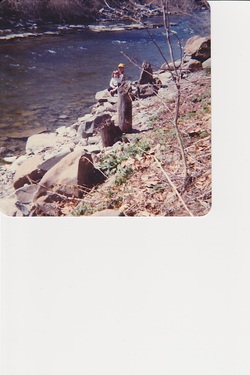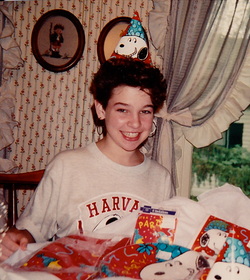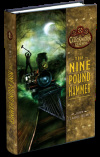 AN EXCERPT FROM THE INTERVIEW: For writers who are dealing with grief in their own WIPs and are overwhelmed with figuring out where to start, what to touch on and what not to touch on, how to get it out… what is your advice on tackling this topic? Whoo, doggy! What a question! With anything that’s so big and abstract, you just need to pick a place and get going. The important thing is to start. General writing advice: start on a day that is different from any other day. My specific advice: keep every thought, every reaction honest. Don’t try to be clever. Readers—especially teen readers—detect insincerity or condescension immediately, and they will throw your book across the room. And well they should. Teen’s minds are too important for bullshit. CLICK HERE to jump to HOLLYWOOD THE WRITE WAY and read the entire interview, along with a review of The Theory of Everything.  So I opened up my soul and poured it into a letter to my teenage self and wrote this for the Dear Teen Me website. And now that it's out there, I kind of can't believe I put it out there on the interwho. Which is a good indicator of just how honest it is. Click this link to go to the letter.  From the TEEN WRITERS BLOC - blog and book reviews from MFA students at the New School read the whole review here: http://www.teenwritersbloc.com/2011/06/02/book-review-girl-j-j-johnson/ Excerpt: "... Author J.J. Johnson could have taken us in the standard direction with this—mean girls torment our heroine until the handsome jock comes to her rescue. Thankfully, Johnson’s Evie and the world she lives in are much more unique and nuanced. Johnson spreads a message throughout the book about the value of activism and standing by your principles, but it rarely comes across as preachy. Instead, Evie and the other characters, who include a boy, a cheerleader who’s more than pom-poms, and a creepy teacher too many teens will recognize, are well rounded individuals with real-world concerns. "One of the great things about this book was that it caused me to think about things I don’t normally think about. Evie, in genuine confusion, wonders why she’s not allowed to use her cell phone or go outside during lunch. I have no doubt that these are real restrictions that kids face, and they had me scratching my head, too. (My high school had an open campus, so even hall passes seem weird to me. I’m not sure how I would have reacted to suddenly being locked inside.) ..." (Posted on TEEN WRITERS BLOC by Mary G. Thompson, June - 2 - 2011)  _This "authorthoughts" interview by thatcovergirl.com isn't exactly new; I'm re-posting due to popular (or perhaps polite) demand. JJ: I really didn’t have a sense of what the cover might look like, and I didn’t give any concept input to Peachtree. The only thing I knew for certain was that I did NOT want what I call a “headless girl body” cover: those YA covers with a photo of a skinny teenager, wearing trendy clothes, whose head is either cropped out of the picture or hidden behind some object. I assume those covers are trying to encourage readers to picture themselves as the heroine (“insert your face here”), but I think they’re very objectifying. Our culture already tells girls to think their bodies and clothes are the most significant part of their identity, and “headless girl body” covers reinforce that idea. What does it say when the heroine of a novel doesn’t have a head worth including on the cover? It’s a subtle message, but it’s unhealthy. Readers need to see whole people, with strong minds and smart brains attached to their healthy bodies.... read the full interview: http://thatcovergirl.com/2011/03/17/authorthoughts-jj-johnson-this-girl-is-different/ OR CLICK OVER THERE TO READ MORE ---->  _ Writing novels is a team sport. I am super lucky to be part of a critique group with three fantastic writers: John Claude Bemis, Jennifer Harrod, and Stephen Messer. We have a great respect and love for each other, and we agree on just about everything, except plot points, spoilers, use of -ly adverbs, characterization, book recommendations, or a name for our group. Anyhoo... did I mention how close we are? We've been meeting regularly since before any of us were published. Now, six years later, our group has more than 9 books published or under contract. But don't take my word for it. Get the scoop from John on Smack Dab in the Middle.  _From the interview: I really didn’t have a sense of what the cover might look like, and I didn’t give any concept input to Peachtree. The only thing I knew for certain was that I did NOT want what I call a “headless girl body” cover: those YA covers with a photo of a skinny teenager, wearing trendy clothes, whose head is either cropped out of the picture or hidden behind some object. I assume those covers are trying to encourage readers to picture themselves as the heroine (“insert your face here”), but I think they’re very objectifying. Our culture already tells girls to think their bodies and clothes are the most significant part of their identity, and “headless girl body” covers reinforce that idea. What does it say when the heroine of a novel doesn’t have a head worth including on the cover? It’s a subtle message, but it’s unhealthy. Readers need to see whole people, with strong minds and smart brains attached to their healthy bodies.... read the full interview: http://thatcovergirl.com/2011/03/17/authorthoughts-jj-johnson-this-girl-is-different/ |